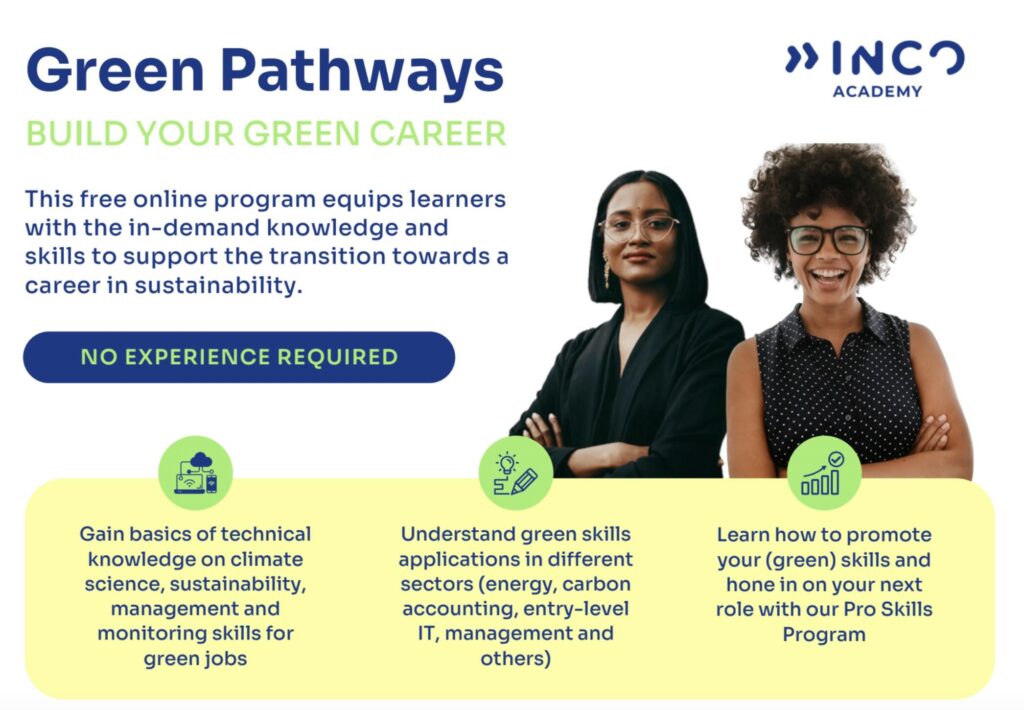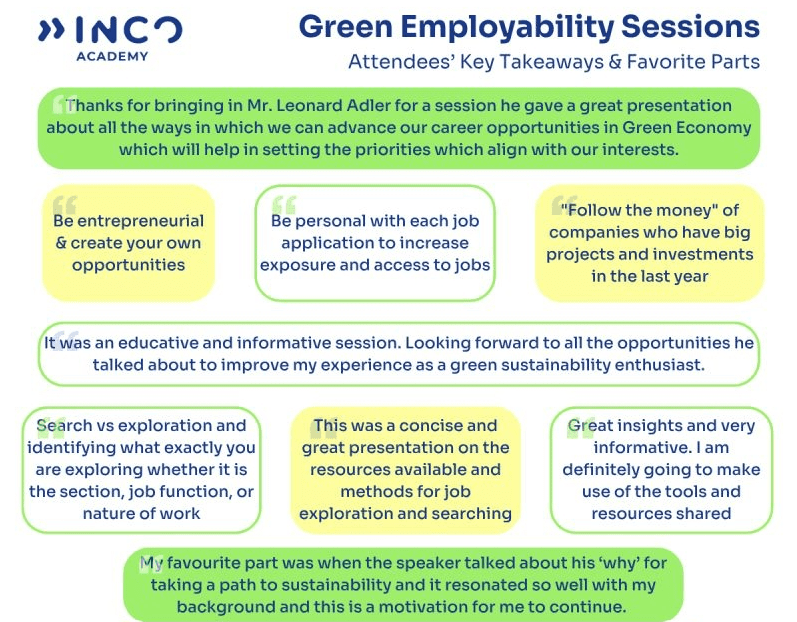
Over the past few weeks, I completed the Green Pathways (Green Digital Certificate) — a 130-hour, self-paced professional program developed and delivered by INCO Academy. This global initiative is designed to help professionals build the skills and confidence needed to thrive in the evolving green workforce. The curriculum blends sustainability education, digital literacy, and professional development to prepare participants for careers that make a measurable environmental and social impact.
I initially joined the program seeking a structured way to strengthen my knowledge of sustainability beyond communications and outreach. What I didn’t expect was how comprehensive it would be in connecting climate science, business strategy, and workforce development all through the lens of modern digital transformation.

Understanding the Business of Climate
My professional background has long focused on storytelling, outreach, and engagement, helping organizations inspire people to adopt more sustainable practices. Through this course, I gained a much deeper appreciation for what happens behind the scenes: how sustainability shapes business operations, procurement, product design, and strategic decision-making.
Some of the most valuable lessons included:
- Understanding carbon accounting frameworks like Scopes 1, 2, and 3, which classify emissions from direct operations to supply chains and consumer use.
- Examining how business leaders balance profitability with impact, making choices that weigh financial performance against environmental responsibility.
- Exploring resource efficiency and circular design, especially as global demand for energy, water, and critical materials increases.
This perspective revealed the importance of systems thinking — how sustainability isn’t a single department or initiative, but a way of running an organization responsibly from end to end.

Learning from Experts — Not Just Coursework
While the foundational modules provided a solid grounding in sustainability principles, the real value for me came from the live webinars and recorded sessions featuring professionals across the climate, tech, and policy sectors.
These sessions provided insider perspectives from people working on everything from carbon accounting and corporate sustainability reporting to renewable energy innovation and circular supply chains. Hearing how they approached complex environmental challenges gave life to the material and helped bridge the gap between theoretical knowledge and real-world application.
The inclusion of career development workshops and mentorship opportunities was another highlight of the program — helping participants refine their goals, build confidence, and explore emerging “green and greening” career pathways.

What the Program Covers
The Green Pathways Certificate spans a thoughtfully structured series of modules designed to connect environmental understanding with actionable career skills:
- Foundations of Sustainability in Tech – The intersection of technology and the environment, including ways to reduce digital emissions.
- Green Design Principles & Practices – How responsible design choices can reduce impact and improve circularity.
- Environmental Costs and Opportunities of AI – Understanding both the challenges and solutions AI offers for sustainability.
- Green & Greening Careers – Mapping out the rapidly growing job landscape within the green economy.

Participants then choose elective modules such as:
- Green Digital Marketing (identifying and preventing greenwashing)
- Green Digital Infrastructure (reducing data center and IT emissions)
- Carbon Accounting & AI (tools and methodologies for measuring emissions)
- Responsible Design (evaluating and improving eco-design in digital products)

Finally, a Capstone Project ties it all together applying course concepts to improve a product, service, process, or career path by making it more sustainable. (My capstone project focused on my career aspirations in the waste management industry.)
A Global Learning Community
Beyond the technical and theoretical learning, one of the most rewarding parts of the experience was the sense of global community. Participants connected from around the world, all motivated by the shared goal of creating a more sustainable future.
The INCO Academy team fostered an inclusive learning environment, with facilitators hosting live sessions, discussions, and peer-sharing opportunities. This collaborative space encouraged dialogue about local challenges, cultural perspectives, and industry trends that made the course feel much larger than a typical online certificate.

Why This Matters for My Career
Completing the Green Pathways program strengthened my foundation for bridging communications and sustainability strategy, a balance that’s becoming increasingly vital in the modern green workforce.
It reinforced that the sustainability movement isn’t limited to scientists or engineers; it’s an ecosystem of professionals from diverse backgrounds, like marketers, designers, policymakers, entrepreneurs, all playing key roles in driving transformation.
For me, it deepened the connection between my environmental communications work and the broader operational and strategic frameworks guiding sustainable business today. It also inspired me to think critically about how to communicate complex sustainability topics, like carbon reduction, resource efficiency, and green innovation, in ways that resonate with both businesses and communities.

If you’re looking to explore the professional side of sustainability or want to pivot into a green career path, INCO Academy’s Green Pathways Certificate is a great entry point. It’s accessible, practical, and full of opportunities to connect with a global network of change-makers.
Here’s to building a more informed, connected, and sustainable workforce — one course at a time.



